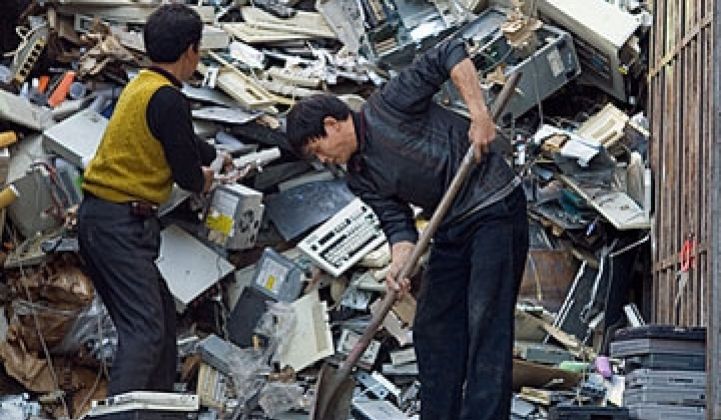Dell Inc. (NSDQ: DELL) says it's going above and beyond leading standards when it comes to recycling used electronics, an industry that critics say is bringing tons of toxic materials to developing countries.
Dell said Tuesday that it will stop shipping any non-working electronics containing toxic materials to those countries, whether on its own or through third parties. Only products being sent back to manufacturers for warranty repairs will be exempted.
That goes beyond guidelines banning non-working electronics based on what chemicals they contain, as laid out by the Basel Convention, a group formed in 1992 to address international movement of hazardous waste.
That makes Dell "the first computer company to explicitly ban the export of electronic waste to developing countries," said Mark Newton, senior manager of environmental sustainability. Developing countries are defined as those that don't belong to the Organization for Economic Co-Operation and Development, which includes most of the world's richest nations.
Of course, Dell is far from the only electronics maker with a recycling policy. Sony, Panasonic, Hewlett-Packard, Sharp and Toshiba are among the many offering to help customers recycle their used gear instead of throwing it in the garbage (see Sony Expands Recycling Effort, HP Ups Ante in E-Waste With Cash Rebates to Consumers and With Digital TV Conversion Coming, Panasonic Paves Way for Recycling).
It's a big business. Fresno, Calif.-based Electronic Recyclers said the worldwide market was headed toward $11 billion last year, with an annual growth rate of about 8.8 percent. And Pike Research earlier this month predicted that "e-waste" will grow to a global volume of 73 million metric tons by 2015 before recycling efforts begin to curb its growth (see Green Light post).
Dell recycled about 290 million pounds of electronics last year, about 10 percent more than its goal, and wants to recycle a billion pounds per year by 2014, Newton said. In February, it expanded its free recycling program through Goodwill Industries and an online offering.
About 400,000 tons of e-waste goes to recyclers every year, according to Environmental Protection Agency estimates, said Barbara Kyle, national coordinator of the nonprofit Electronics TakeBack Coalition.
But not all recycling programs are created equal, she said. From half to four-fifths of electronics tagged for recycling goes to operations in China, India, Southeast Asia and West Africa where it is disassembled, burned and eaten away with acids, often by hand, with dire health and environmental consequences, she said.
That's a growing environmental concern, given that electronics contain such poisons as lead, mercury and cadmium, as well as dangerous organic compounds like polychlorinated biphenyls (PVC) and brominated flame retardants (BFRs). Groups from Greenpeace and the Basel Action Network to the U.S. Government Accountability Office have found that much of the electronics meant to be recycled ends up in countries where low labor costs and lax environmental controls leads to widespread unsafe recycling.
Dell's new policy "is now the highest standard in the industry," Kyle said. "We'd like to see Congress adopt a federal policy modeled on Dell's standard."
Dell's new push on its e-waste efforts comes at a time when the Austin, Texas-based company's reputation on the matter has been slipping somewhat. Greenpeace's most recent "Guide to Greener Electronics" released in March downgraded Dell from its once-lofty fifth place ranking to No. 13.
Dell's downgrade was based on its "backtracking on its commitment to eliminate PVC and BFRs in all its products by 2009," according to the report.
The Greenpeace list included top-ranking Nokia, as well as top-ten ranked Samsung, Sony Ericsson, Philips, Sony, LG, Toshiba, Motorola, Sharp and Apple. Below Dell were Lenovo and HP, which was dinged by Greenpeace for the same slipping on PVC and BFR phase-out goals, as well as Microsoft and last-place Nintendo.
Dell's Newton addressed that topic Tuesday, saying that Dell and other electronics manufacturers were having a hard time coordinating the phase-out of those chemicals with suppliers.
Dell's other green efforts include a push to cut 20 million pounds of packaging material (see Green Light post) and large-scale purchases of renewable energy, which put it in the top ten in a recent ranking of corporate green power purchasers (see Government, IT Biggest Buyers of Green Power).
The PR value of going green for IT firms can be guessed at by how the companies involved like to undercut each other's claims, such as a dispute that arose between Dell and Apple in December over which company offered the "greenest" laptop (see Dell to Apple: Our Laptop is Greener Than Your Laptop).



